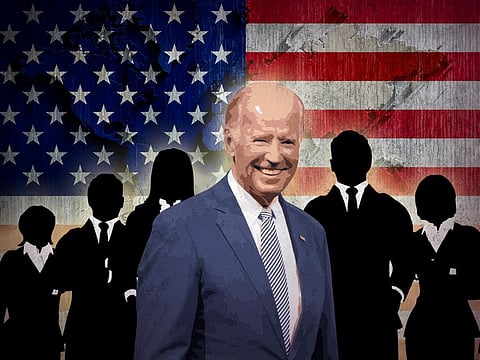Will Joe Biden lead the next wave of democracy?
US must help stop further erosion of democratic systems around the world

For the last fifteen years, the world is witnessing a decline in the number of democracies and worsening of political rights and civil liberties. Not only new democracies are losing their democratic character, but even large and established ones also have not been able to escape the global trend.
Since last year, the Covid-19 pandemic has made it further easier for the several populist leaders to clamp down on dissent and grab even more power for themselves.
While democracy is passing through a dark phase, the change in the US administration has brought some new hope. The new President Joe Biden has proposed a global summit for democracy to bring together the world’s democracies to strengthen their democratic institutions, and also to confront backsliding countries.
After the end of the Cold War in Europe, the US has led from the front in openly supporting and promoting democracies worldwide. After George W. Bush’s big gamble in the Middle East became too expensive both militarily and financially for the US, the Obama administration of eight years kept itself away from the democracy-promotion projects.
In the last four years, the Trump administration took a complete reverse turn, both within and outside the country. Democratic institutions in the US suffered severe erosion, and even the electoral process came under serious scrutiny due to allegations of partisan manipulation.
And, Trump’s foreign policy even kept distancing itself from its democratic allies in Europe while courting authoritarian ethno-nationalist populists.
So, there is no doubt that Joe Biden’s lead in bringing the world’s democracies under one roof in a global summit, planned to be later this year, is a welcome development for anyone who supports democratic values.
Joe Biden’s Secretary of State, Antony Blinken, in his nomination hearing before the Senate Committee, was emphatic about the new administration’s intent, “Our charge is to put democracy and human rights back at the centre of American foreign policy.”
Rising populism
To explain the purpose behind convening the global summit of democracy, he elaborated that it would provide an opportunity for participating democratic countries to reflect upon the challenges they encounter due to rising populism.
There is nothing wrong with this intention, but the real problem is many democracies in the world are presently led by populists. Is the Biden administration thinking of a summit of democracies and not inviting some nations?
Whom to invite and whom to not to is not going to be the only challenge for Joe Biden in leading the process to start the possible Fourth Wave of Democracy. (the first wave was in the early 19th century, the second wave was after the 2nd World War, and the third wave was from 1974 with democratisation in southern Europe and continued for almost two and half decades). Hosting a summit is good, but the real worry comes from a lack of clarity about the intention.
If the US plans to create an alliance of democracies vis-a-vis the China-Russia axis, the world will be again pushed to the Cold War era.
This confrontational alliance politics will force many poor developing countries to join sides when they need all the support they can get from anyone willing to build their economies and improve their citizens’ standard of living. Not only that, the world is at a critical stage now that it can’t afford to be divided into two warring blocs.
The threat of global climate change and the pandemic induced economic crisis are too big to be successfully challenged by any country or a group of countries. In this globalised world, the problems have also become global, demanding a worldwide effort to address them successfully.
Fight against climate change
Biden administration has shown its intent that it is committed to fighting against climate change. For that, it has no option but to cooperate with China.
Even following the British prime minister’s idea to expand the G7 to a D10 (by including Australia, South Korea, India) to neutralise China’s economic power might also be counterproductive for the US.
The formation of D10 will indeed smell bloc politics. The global economy is now in a precarious stage to continue a trade war, which the Trump administration had waged, inflicting significant self-harm.
Thus, the Biden administration should not fall into the trap of hubris and wage a crusade to democratise the world. Democratic movements need to be home-grown, and that should be the message from this global summit. In recent years, the world has already seen many terrible cases of abject failures in executing plans to impose democracies under the grab of responsibility to protect.
The best possible option for the US now is to help to stop the further erosion of democracies in the world. For that, it can provide moral and resource support to the groups and activists fighting against the weakening of democratic institutions and the deterioration of human rights in their countries sliding down in the democracy index ladder.
Thankfully, the Biden administration plans to invite to the summit not only the leaders of the democracies but also civil society actors engaged in democratic movements around the world.
This summit can also be a platform to invite all democracies, established, weak, and even ailing ones, so to use it to convey a united message to the ethno-nationalist populist leaders that the world is watching them.
At the same time, for the benefit of the world and his country, Joe Biden should not only refrain from taking a missionary approach and going around the world to democratise other countries but also not make an attempt to create an economic alliance or military bloc of democracies.
The world at this stage just can’t afford another Cold War.






